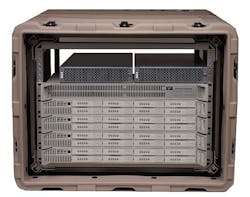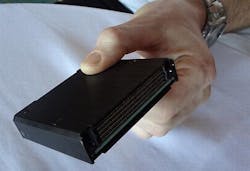Mercury Systems to boost expertise in embedded computer servers and military C4I with Themis acquisition
ANDOVER, Mass. – Executives of embedded computing specialist Mercury Systems in Andover, Mass., are boosting their company's expertise in rugged computer servers and in military command, control, communications, computers and intelligence (C4I) with their acquisition of Themis Computer in Fremont, Calif.
Mercury has agreed to buy Themis for $180 million cash, Mercury officials announced this morning. Themis designs rugged computer servers and data storage systems based on commercial off-the-shelf components for U.S. and international military programs.
Mercury, meanwhile, focuses on secure sensor and safety-critical embedded processing subsystems, as well as on RF and microwave and electronic warfare (EW) systems for military applications.
Themis has a long history providing rugged embedded computing systems for U.S. Navy surface warships and submarines. The company also has concentrated on rugged hyperconverged computing architectures for mobile military data centers than could fit in the back of light armored combat vehicles.
Mercury executives have not made a decision yet on whether to retain the Themis name and brand as a segment within Mercury, or to consolidate all Themis-developed technologies under the Mercury name, says Ian Dunn, vice president and general manager of Mercury's sensor and mission processing group.
They will make a final decision on the future of the Themis brand after the acquisition closes at the end of March, Dunn says. One possible hint: "We love the Mercury name, and that will be the dominant brand," Dunn says.
The combination of Themis's experience and installed base of rugged computer blade servers, and Mercury's expertise in secure trusted computing may be particularly attractive to the Navy, Dunn says. "Programs on our radar screen are about secure processing," he says. "When we look at the collective programs of the two companies, the Navy is a critical component of that."
Another potentially beneficial synergy of the two companies is the Themis expertise in small-form-factor embedded computing and Mercury's know-how in RF and microwave and electronic warfare (EW) systems -- particularly for unmanned aircraft.
Related: Navy orders computer rugged servers from Themis for shipboard electronics applications
Themis was one of the first proponents of a small-form-factor embedded computing industry standard called VITA 74 VNX -- a VPX-like embedded computing standard designed to meet needs for extremely small size, weight, and power consumption (SWaP) in rugged mobile applications in military, transportation, and industrial automation.
Another big proponent of VITA 74 VNX technology was CES Creative Electronic Systems SA in Geneva, Switzerland, which Mercury acquired last year. "Themis does bring some interesting pieces, and one is small form factor," Dunn points out.
This small-form-factor capability could fit well with Mercury's airborne electronic warfare technologies. "It's about the capability to be small and lower power, and Themis brings more capabilities in the portfolio that could be useful in the electronic warfare community in the future," Dunn says.
Mercury, which recently moved its headquarters from Chelmsford, Mass., to Andover, Mass., has been in serious acquisition mode for the past several years.
Related: Navy continues buying radar-spoofing electronic warfare (EW) equipment from Mercury Systems
Last April Mercury boosted its expertise in RF and microwave technologies for military and space applications with their acquisition of Delta Microwave Inc. in Oxnard, Calif., for $40.5 million in cash.
One year ago Mercury enhanced its expertise in rugged mobile safety-critical mission computing for commercial and military aviation with its acquisition of CES for $39 million in cash.
In April 2016 Mercury acquired additional expertise in anti-tamper and trusted computing technologies by purchasing the Microsemi Corp. embedded security, RF and Microwave, and custom microelectronics businesses for $300 million.
In December 2015 Mercury heightened its profile in secure computing and military and commercial engineering design services with their acquisition of Lewis Innovative Technologies Inc. (LIT) in Decatur, Ala. Terms of that transaction were not released.
Related: Small-form-factor rugged computer for military wearable electronics introduced by Themis
The Themis acquisition is particularly beneficial to Mercury because Themis is on a rapid growth trajectory supported by several key design wins that are switching to production, Mercury officials say.
The acquisition of Themis "will expand our position in the growing command, control, communications, computers and intelligence (C4I) market," says Mark Aslett, Mercury's president and CEO. Themis has "a large installed base and designed-in as a sole-source provider of rugged rack-mounted servers for some of the largest Navy and Army server programs in the U.S. Department of Defense."
The Themis acquisition also brings Mercury's expertise in security IP and trusted computing to the Themis customer base, Aslett points out.
"It's a good match; there is a lot of technology overlap," says Jerry Gipper, executive director of the VITA open standards and open markets embedded computing trade association in Oklahoma City. "Mercury is doing a really great job of building a defense supplier infrastructure."
Mercury's acquisition of Themis is subject to customary closing conditions, and should close by the end of March 2018. For more information contact Mercury Systems online at www.mrcy.com, or Themis Computer at www.themis.com.
Ready to make a purchase? Search the Military & Aerospace Electronics Buyer's Guide for companies, new products, press releases, and videos


